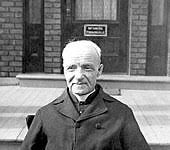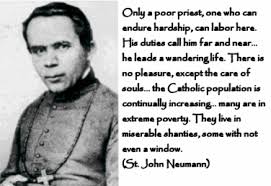Saint Norbert (+1134) was a zealous bishop and founder, at the forefront of the ecclesial reform named after Pope Gregory VII, Hildebrand, who was its initial impetus. Norbert was born ten years before the death of the influential Pontiff in 1085, but it was not until his 35th year, in 1115, that he underwent a deep conversion – like the later Martin Luther (a more tragic tale) Norbert survived a lightning strike, and afterward vowed his life to God. Norbert’s reform began first with himself, retreating to a life of prayer and penance, taking on a rather extreme asceticism.
At the request of Pope Callixtus II, Norbert founded a community of priests, who would live an active life, but centred on a monastic rule and haven, the Order of Canons Regular of Prémontré, colloquially called the Norbertines or the Premonstratensians, officially established on Christmas Day, 1120, and the Order flourished, emphasizing devotion to the Eucharist and Our Lady.
Six years later, Norbert was appointed bishop of Magdeburg, which would remain a staunchly Catholic enclave until the preaching of Martin Luther four centuries hence, which, along with the influence of secular princes, would turn the city Protestant. But hope abounds, as always.
Upon Norbert’s death on this day in 1134, his body was brought to Prague, where it is on display in a glass-fronted sepulchre. He was canonized by Pope Gregory XIII in 1582, the same year that the same pontiff reformed the calendar which now goes by his name, to correct the slightly-inaccurate Julian one (as discovered by Jesuit astronomers under the brilliant Christopher Clavius), abolishing two weeks of that year by papal fiat, (by the bull Inter Gravissimas) so that Thursday, October 4th, 1582, would be followed by Friday, October 15th, 1582. So from Gregory to Gregory, but, as always, the saints and what they signify transcend the temporal vagaries of this world.
And speaking of time, this is also the 75th anniversary of the D-Day landings at Normandy, when 150,000 soldiers – many of them young and untested – of various nations on the Allied side stormed the beaches of the north of France, then occupied and fortified by the Nazi German forces. The losses were heavy, with an estimated 5000-12,000 killed on the Allied side, while the Germans suffered 4000-9000 killed, wounded or missing, along with 200,000 taken prisoner. The scale boggles the imagination, and one must stand in awe of men wading ashore through relentless machine-gun fire, trying to manoeuvre with heavy packs and guns through sand, hoping against hope that they might just survive.
We should honour and pray for them all, the dead, and the ever-smaller band of survivors, and the cause for which they died.
Yet we should also remember how easy it is to lose freedom and virtue in a society. Many of the children of those soldiers were devotees of the sexual revolution in the sixties, and voted for Pierre Elliot Trudeau. Whether or not, as a rebellious, pacifistic, anti-war 23 year old, he drove around Quebec on a motorbike wearing a spiked, Prussian helmet and brandishing a swastika is up for some historical debate, but many of Trudeau’s principles were not far from those of the socialism adopted by the Germans and Russians. And the soldiers’ grandchildren, too many of them a coddled generation raised by an ever-more deviant nanny state, have now vested the same authority in his son Justin.
Both pere et fils and their sycophants have instantiated a Nazi-esque anti-life ethos in this nation, the state-funded execution of the unborn, the elderly, the sick, along with a relentless increase in state authority and intrusion – witness yesterday’s ‘debate’ on freedom of speech – that would have made those D-Day soldiers wonder what they were fighting and dying for, if it were all going to end in what we have in Canada, 75 years on, frittering away our fiercely fought freedoms, and tragically misusing what freedoms we still have. And it’s only going to get a lot worse, unless we turn things around, and soon.
So as we remember, let us continue their fight on for liberty, for justice and for truth, a war from which we can never rest easy, for which we too must be willing to suffer and even to die. Onward, Christian soldiers!









